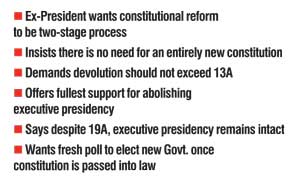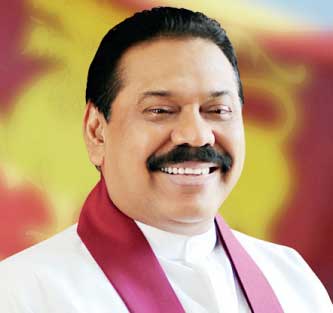Thursday Feb 19, 2026
Thursday Feb 19, 2026
Monday, 18 January 2016 00:00 - - {{hitsCtrl.values.hits}}
 Former President and Kurunegala District Legislator Mahinda Rajapaksa has extended his fullest support for the abolition of the executive presidency, but accused the Government of trying to hoodwink the public by introducing a brand new constitution with several suspicious provisions entrenched.
Former President and Kurunegala District Legislator Mahinda Rajapaksa has extended his fullest support for the abolition of the executive presidency, but accused the Government of trying to hoodwink the public by introducing a brand new constitution with several suspicious provisions entrenched.
Speaking to clergy and political supporters at the Abhayaramaya temple in Narahenpita on Saturday, the former Head of State said the single most important pledge the current Government was elected on was the abolition of the executive presidency.
The SLFP he said, had been opposed to the executive presidency, which Rajapaksa himself held for nine years, since its inception in 1977.
“The 19th Amendment to the constitution passed last year purported to reduce the powers of the presidency, but the executive powers of the president still remain intact,” Rajapaksa charged.
He noted that the preamble of the resolution introduced in Parliament last Saturday by the prime minister repeatedly stressed that the main objective of the new constitution would be to abolish the executive presidential system and to institute electoral reform.
“These objectives should receive our fullest support. The executive presidential system was mired in controversy from the beginning. The SLFP opposed it even when it was first instituted. Now when the very UNP that created this position is putting forward proposals to abolish it, we in the SLFP cannot oppose it,” he argued. 
The former President said “other constitutional changes” should not be mixed up with the two key issues of abolishing the executive presidential system and electoral reform, over which widespread consensus had built up over a period of time. “The constitutional reform process should proceed in stages, taking up the abolition of the executive presidency and the reform of the electoral system first, and then going on to other matters,” he insisted.
Rajapaksa said that the executive presidency had been initially brought as the second amendment to the 1972 constitution which was passed in October 1977.
“The then Prime Minister J.R. Jayewardene was sworn in as the first executive president of Sri Lanka on 4 February 1978 on the basis of that amendment. It was after the executive presidential system was created that the 1978 constitution was promulgated incorporating the newly created executive presidency. Because of the special circumstances that we face today, I believe a similar two-stage approach will have to be adopted in abolishing the executive presidential system as well,” he said.
The nationalist leader warned that the people were suspicious that provisions inimical to the unitary character of the Sri Lankan state may find their way into the new constitution, if it was passed as a single document.
“So by breaking up the constitution making process into different stages, we will be able to get the provisions that require a referendum passed first, leaving the rest to be dealt with later,” he said.
The former President also claimed there were misgivings about the abolition of the executive presidency since the institution was seen as keeping the country together in the context of powers devolved to the provincial councils by the 13th Amendment.
“The devolution of power in the new constitution should not exceed the provisions of the 13th Amendment that have been implemented at present. There should also be no merging of provinces. The police and land powers accorded to the provincial councils through the 13th Amendment need to be re-examined. The safeguards available to the Indian central government in relation to the utilisation of land are not available to the Sri Lankan government,” he charged.
Rajapaksa also said that once the new constitution is passed into law, fresh elections may be called to elect a new Government. (DB)